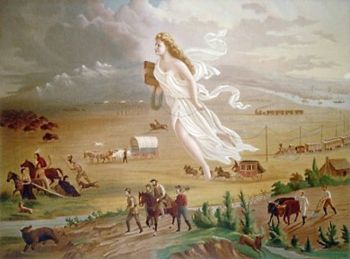Manifest Destiny
Manifest Destiny is a 19th-century belief that the United States had a
mission to expand, spreading its form of democracy and freedom. Advocates of
Manifest Destiny believed that expansion was not only good, but that it was
obvious ("manifest") and certain ("destiny"). Originally a political catch
phrase of the 19th century, "Manifest Destiny" eventually became a standard
historical term, often used as a synonym for the territorial expansion of the
United States across North America towards the Pacific Ocean.
The term was first used primarily by Jacksonian Democrats in the 1840s to
promote the annexation of much of what is now the Western United States (the
Oregon Territory, the Texas Annexation, and the Mexican Cession). It was revived
in the 1890s, this time with Republican supporters, as a theoretical
justification for U.S. expansion outside of North America. The term fell out of
usage by U.S. policy makers early in the 20th century, but some commentators
believe that aspects of Manifest Destiny, particularly the belief in an American
"mission" to promote and defend democracy throughout the world, continued to
have an influence on American political ideology.
Manifest Destiny was always a general notion rather than a specific policy.
The term combined a belief in expansionism with other popular ideas of the era,
including American exceptionalism, Romantic nationalism, and a belief in the
natural superiority of what was then called the "Anglo-Saxon race," i.e., whites
of English heritage. While many writers focus primarily upon American
expansionism when discussing Manifest Destiny, others see in the term a broader
expression of a belief in America's "mission" in the world, which has meant
different things to different people over the years. This variety of possible
meanings was summed up by Ernest Lee Tuveson, who wrote:
A vast complex of ideas, policies, and actions is comprehended under the
phrase 'Manifest Destiny'. They are not, as we should expect, all compatible,
nor do they come from any one source.
The concept of Manifest Destiny has acquired a variety of meanings over the
years, and its inherent ambiguity has been part of its power. In the generic
political sense, however, it was usually used to refer to the idea that the
American government was "destined" to establish uninterrupted political
authority across the entire North American continent, from one ocean to the
other.

This painting (circa 1872) by John Gast called American
Progress, is an allegorical representation of Manifest Destiny. Here
Columbia, intended as a personification of the United States, leads civilization
westward with American settlers, stringing telegraph wire as she travels; she
holds a schoolbook. The different economic activities of the pioneers are
highlighted and, especially, the changing forms of transportation. The Indians
and wild animals flee.
